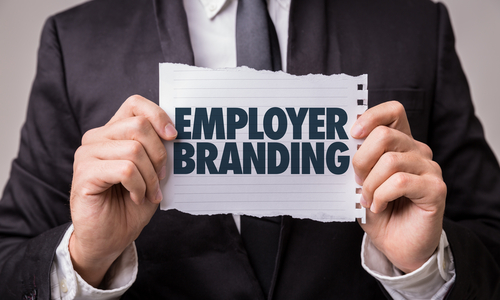When organizations go into survival mode, their leaders often forget just how vital employer branding is to overall business health and success. This is becoming more and more evident as companies and analysts try to determine whether we are headed toward another economic recession.
The good news is that many economists believe this is a temporary downturn and we’re heading toward normalization, not devastation. However, even if a recession were inevitable, an employer branding strategy would still be valuable to your business growth plan. In fact, deploying an employer branding strategy is even more essential when times are tough.
The Importance of Employer Branding
Having a strongemployer brand can mean the difference between the ability to rebound after devastation versus struggling for a little while, ultimately ending up with a “closed for business” sign. Company leaders shouldn’t jettison their employer branding solutions when times get tough. Instead, they should protect them, especially now, when they might be going through challenges.
What makes having an employer brand so important even during economic uncertainty? For one, a compelling employer brand can galvanize people and keep them working toward goals. Think about Patagonia’s employer brand, which heralds citizenship above all else. Patagonia is all about story-doing, not just storytelling. No matter the global crisis, workers at Patagonia can lean on and trust the employer brand because it’s fixed, permanent, and authentic. Due to Patagonia’s emphasis on employer branding, employees can stand behind it and drive the organization forward instead of being unsure of what to do next.
An employer brand doesn’t just excite employees and keep them from leaving, though. It can excite talented job candidates, too. Companies with solid, well-understood employer brands don’t have as much trouble recruiting high-achieving workers. Even organizations that are known for expecting workers to give 110% constantly, like McKinsey & Co., don’t lack applicants. McKinsey stands firm on its employer brand, which gives it a great deal of power that appeals to potential candidates.
Lastly, customers notice and react accordingly to a well-considered employer brand. Starbucks is an excellent example of this practice. When you buy a drink at Starbucks, you’re invited to make Starbucks a part of your identity. The company’s employer brand is so strong that it might influence your lifestyle. At the very least, it creates an affinity and attachment that ends up increasing sales and fans. Similarly, a successful employer branding strategy is necessary for your business to generate success both now and in an uncertain future.
How to Start Business Planning for a Recession
Now is the time to double down on the importance of your employer brand. If you’re ready to create or improve your employer brandwithout overspending, try these three strategies:
1. Understand where you are on your employer brand journey.
If you’re just beginning to implement an employer brand strategy, you must focus on research and seek validation. After all, your knowledge of your employer brand is limited. Before launching and activating it, you need to start testing ideas. On the other hand, if you’ve been implementing and refining your employer brand for several years, you should continue doing what made your employer brand successful in the first place.
Employer branding strategies go through different stages of maturity. Knowing where your business fits in the grand scheme of things will help you determine which types of initiatives to consider in the near future. The most important thing is to propel your employer brandforward appropriately, depending on where you are on your employer branding journey.
2. Create buy-in and adoption across your senior levels.
There is no better way to prove the importance of an employer brand to your organization or to keep your employer brand progressing than to have senior-level champions. Until executives in your C-suite embrace the employer brand, you will have difficulty getting everyone to buy into the premise.
Don’t worry if your employer brand is just a small team or your HR department at the moment. It can take time for an employer brand to go companywide. At the same time, you can’t expect everyone to appreciate the value of the employer brand if leadership isn’t supportive.
How can you get executives to understand that the employer brand can provide cohesion, consistency, and efficiency? Come up with employer brand use cases that can be tested and measured. The more you can show that the employer brandis moving and making results, the more likely you’ll be to sway leaders toward your cause.
3. Be an asset to your stakeholders.
Once you’ve named and claimed your employer brand, you need to take it to the people you serve: workers, customers, and vendors. This isn’t an easy task, but it’s critical. When the light bulb goes off and everyone realizes that buying into the employer brand benefits them, your whole organization will undergo a monumental seismic shift for the better.
Making your employer brand come to life is easier than you think. You just have to take the first step. Whenever you can, demonstrate how your employer brand correlates to influential happenings at your company. In time, people always gravitate toward principles that are favorable to them. Showing them how the employer brand affects their day-to-day experience positively will lead them to leverage it, too.
Developing and maintaining an employer brand doesn’t have to be a big-budget, sophisticated, time-demanding process. Regardless of your organization’s size, you can still maintain a stellar employer brand. And at this moment, you need to consider it to be one of the most important and necessary ways to construct a recession-proof business that stands tall no matter how hard the economic winds blow.
Bryan Adams is the CEO and founder of Ph.Creative, a global employer branding agency. He is a prominent employer brand thought leader and an author, a podcaster, and a speaker.

